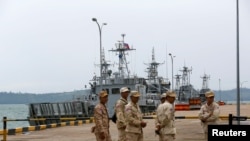VOA national security correspondent Jeff Seldin contributed to this article.
CAMP H. M. SMITH, Hawaii - A senior U.S. Indo-Pacific Command officer August 15 confirmed Cambodia and China are proceeding on a base for China's navy in the Southeast Asian country's Preah Sihanouk province.
Army Brigadier General Joel B. Vowell said construction would begin next year at Ream Naval Base, confirming to a group of regional journalists here that Cambodia will grant China access to the deep coastal waters on the Gulf of Thailand.
"We have information that tells us that there will be some development by the People's Republic of China to facilitate a naval base at Ream," said Vowell, the command's deputy director for strategic planning and policy.
"So that tells me they want to build something there, facilities to wharf, to house and sustain naval projection of combat power from Ream," he said.
Pentagon officials in Washington would not comment on Vowell's remarks.
Vowell called China's military extension plans in Cambodia "a big concern" for the U.S. and its allies in the region.
The Ream base offers deep-water access to the Gulf of Thailand, which gives ready access to the South China Sea. China claims most of the South China Sea area, where the Philippines, Vietnam, Malaysia and Taiwan maintain competing claims to its islands and potentially resource-rich waters, now dotted by islands constructed by Beijing.
Donald Emmerson, director of the Southeast Asia program at the Shorenstein Asia-Pacific Research Center at Stanford University, said that if China uses the Ream base, it would be "extremely dangerous."
The Wall Street Journal first reported the military deal between Cambodia and China in July, saying the arrangement would allow China to use the base for 30 years, with automatic renewals every 10 years, and allow Beijing to build military facilities and buildings on the 100-hectare base.
China and Cambodia denied the report, but Vowell disputed those denials.
"Ask them to take you on that tour in May of next year, and see what's been built," Vowell said. "I'm almost positive it [won't] have a Cambodian or U.S. flag on it. It'll have a Chinese flag."
Vowell also expressed concern over Chinese construction of an airport and resort in Koh Kong province, 70 kilometers north of Ream Naval Base.
Cambodia's Prime Minister Hun Sen and Defense Minister Tea Banh have not answered a June 24 Pentagon letter to them about the Ream plans, although there has been lower-level engagement.
In the June 24 letter, U.S. Deputy Defense Secretary for South and Southeast Asia JosephFelter expressed concerns about Cambodia's rejection of U.S. assistance for repairing a training facility and boat maintenance depot at the base.
Felterrecounted his visit in January to the base, where he received a request from an unnamed deputy commander who requested U.S. help with repairs.
Earlier this week, the spokesman for Cambodia's Ministry of Defense, Chhum Socheat told VOA that a U.S. military attaché based in Cambodia had been summoned on July 1 and asked to explain the concerns in Felter's letter, adding that Cambodia's constitution prohibits a Chinese military presence at Ream.
"Secondly, if you want to use a naval base in Cambodia, I would say it is better to use Hainan Island because it is closer [to China] and has deeper [water compared] to here," he said. The island is part of China's southernmost province.
Vowell, speaking on August 15, said Cambodia must respond to Felter's letter before the command can decide what to do.







